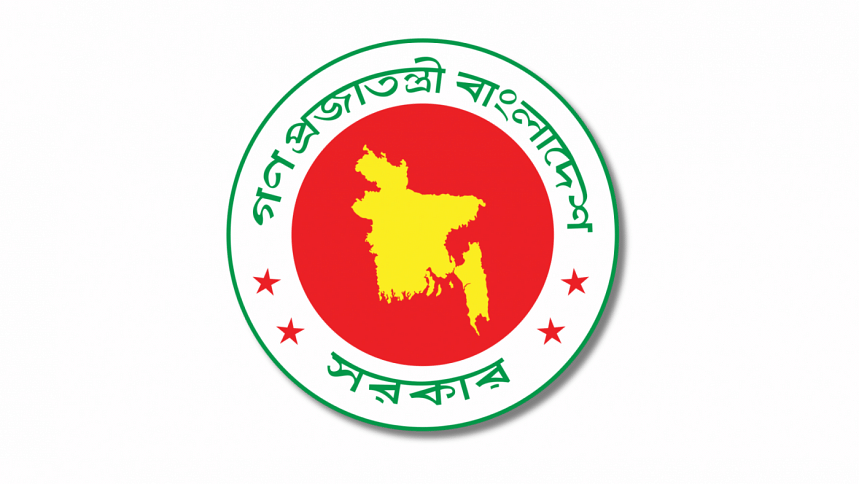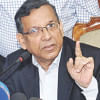Jamaat-Shibir banned

The government yesterday banned Jamaat-e-Islami and all its front organisations and entities, including Islami Chhatra Shibir.
After the law ministry's approval, the home ministry yesterday issued a gazette notification banning the anti-Liberation party and all its associate outfits.
The gazette came into effect immediately, meaning Jamaat and its front organisations are now not allowed to be in politics.
The ban came three days after a meeting of the Awami League-led 14-party alliance, with Prime Minister and AL chief Sheikh Hasina in the chair, unanimously recommended banning Jamaat-Shibir for their alleged involvement in anti-state activities.
According to yesterday's gazette, the government took the decision as per section 18 (1) of the Anti-Terrorism Act-2009 and listed it as a banned entity under the second schedule of the act.
The section reads: "For the purposes of this act, the government, on reasonable grounds that a person or an entity is involved in terrorist activities, may, by order, enlist the person in the schedule or proscribe the entity and enlist it in the schedule."
The notification said the government has enough evidence that Jamaat and Chhatra Shibir were directly involved in the recent killings, and destructive and terrorist activities and had also incited them.
The International Crimes Tribunal in several verdicts held Jamaat and Chhatra Shibir (previously known as Islami Chhatra Sangha) liable for committing genocide, war crimes, and crimes against humanity during the Liberation War in 1971.
The notification mentioned the verdicts the International Crimes Tribunal-1 delivered in the case against former Jamaat ameer Ghulam Azam and also the ones International Crimes Tribunal-2 delivered in the cases against Jamaat leaders Abdul Quader Mollah and Muhammad Kamaruzzaman.
Five top leaders of Jamaat were sentenced to death for their crimes against humanity committed during the Liberation War.
In August 2013, the gazette said, the High Court declared the registration of Jamaat with the Election Commission illegal. The Supreme Court later upheld the HC verdict.
Justice seekers and war crimes victims and their family members have long been demanding the trial of Jamaat as a party. Their voices grew louder after February 5, 2013, when people occupied Shahbagh demanding highest punishment for war criminals and a ban on Jamaat-Shibir.
The investigation agency of the tribunal recommended that charges be pressed against Jamaat after concluding a probe into Jamaat's role in 1971.
Law Minister Anisul Huq on many occasions had said that the government would amend the International Crimes (tribunals) Act-1973 to try parties, but the act was neither amended nor the charges were pressed.
The issue of banning Jamaat came up again after the government blamed Jamaat-Shibir men for the recent violence centring the quota reform protests.
Shyamoli Nasreen Chowdhury, president of Ekattorer Ghatak Dalal Nirmul Committee, said, "With the banning of Jamaat, we are relieved of the curse. We are satisfied with the decision."
She, however, demanded confiscation of all properties belonging to Jamaat and its associate bodies.
"Measures should also be taken so that Jamaat cannot emerge in politics again under a new banner," she said.
Shyamoli, widow of Shaheed Alim Chowdhury, said they have long been demanding trial and ban of Jamaat for committing crimes in 1971.
"Jamaat even came to power and carried out terrorist activities. We are happy as they [Jamaat] are finally banned," said the eminent teacher who testified in a war crime trial.
Prof Anu Muhammad, a former teacher at Jahangirnagar University, said the issue of banning Jamaat-Shibir has been discussed for a long time.
"But the government has banned Jamaat-Shibir to gain political mileage at a time when a massive movement is going on in the country," he said.
JAMAAT'S RESPONSE
Hours after issuance of the gazette, Jamaat Ameer Shafiqur Rahman in a statement said, "We strongly condemn and protest this unconstitutional, undemocratic and unjust decision of the government."
The constitution gives all citizens the right to assemble and organise. The government has violated the constitution by banning Jamaat and Chhatra Shibir, he said.
"The government wants to divert the ongoing movement by banning Jamaat and Chhatra Shibir through an executive order to cover up their misdeeds.
"However, they may try to increase their efforts to blame Jamaat by creating some untoward incidents. The countrymen should be careful in this regard," he added.
BNP'S RESPONSE
The BNP yesterday said it was unfair and unconstitutional to ban any political party without a justifiable, credible, acceptable, and impartial investigation of international standards.
BNP Secretary General Mirza Fakhrul Islam Alamgir in a statement sent to the media last night said, "The right to form a political party or organisation is enshrined in the constitution of Bangladesh. With this constitutional right, anyone can form a political party or organisation."
It also said with these undemocratic activities, the government would not be able to divert people's attention from the BNP's one-point demand, resignation of the government.
"We call upon all those who believe in democracy, irrespective of party affiliations and opinions, to intensify the movement to topple the government," the statement read.
It also noted the "Awami League's past affinity with Jamaat". "They were once allies. During the all-party mass movement against autocracy in the 1980s, the Awami League, along with Jamaat-e-Islami, undermined the movement and participated in an election to legitimise autocracy," it said.
The then leaders of Jamaat met Hasina at her Dhanmondi-32 home and presented her a Quran and jainamaz, it said, adding that many remember the smiling pictures of the leaders of both parties exchanging gifts.
ICT VERDICTS
The ICT-1 in the verdict against Ghulam Azam observed, "… Jamaat-e-Islami, as a political party under the leadership of accused Prof Ghulam Azam, intentionally functioned as a criminal organisation especially during the War of Liberation of Bangladesh in 1971."
The Tribunal-2 in the verdict against Kamaruzzaman observed, "Jamaat-e-Islami had played a substantial role in the formation of the Al-Badr, Razakar, Al-Shams and peace committees [during the war].
"Jamaat had indulged in indiscriminate massacre of their political opponents belonging to the Bangalee nation in the name of liquidating 'miscreants' and 'infiltrators' for which it had used Razakars and Al-Badr."
Timeline
- In 1941, Jamaat was founded by highly controversial Islamist ideologue Abul Ala Moududi
- In 1959 and in 1964, the party was banned for its communal role
- In 1971, Jamaat sided with the Pakistan army and worked against the country's liberation
- In 1971, Jamaat formed Al-Badr, Razakar, Al-Shams and peace committees, which were involved in crimes against humanity
- In 1972, Bangladesh government banned Jamaat
- Jamaat was allowed back in politics during late president Ziaur Rahman's rule
- In 1992, Ekattorer Ghatak Dalal Nirmul Committee tried the then Jamaat ameer Ghulam Azam at the people's court (Gono Adalat) for war crimes
- In 2010, the government formed International Crimes Tribunal
- Between 2013 and 2016, five top Jamaat leaders were executed for crimes against humanity in 1971
- In 2013, the HC declared Jamaat's registration with the EC illegal
- In 2018, EC scrapped Jamaat's registration, rendering it ineligible to take part in polls
- In 2023, the SC upheld the HC verdict
- In 2024, Jamaat and its associate bodies are banned

 For all latest news, follow The Daily Star's Google News channel.
For all latest news, follow The Daily Star's Google News channel. 








Comments